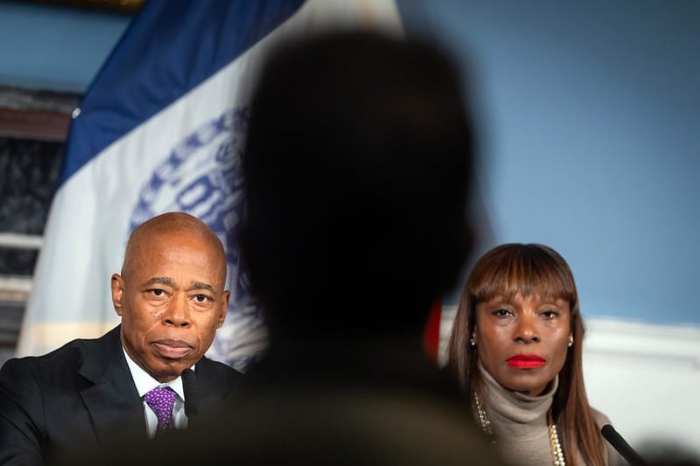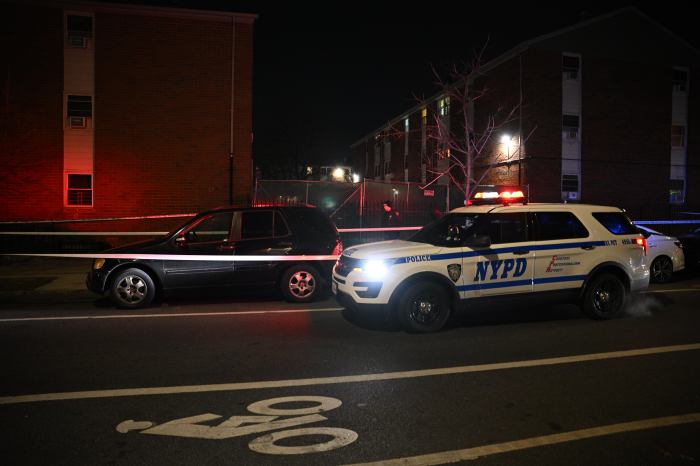
BY ZACH WILLIAMS | Bitcoins have not made it to Wall St. yet, but the fledgling digital currency has a home a few doors down from the New York Stock Exchange at the Bitcoin Center NYC.
Enthusiasts regularly congregate at 40 Broad St. on Monday and Thursday nights for informal currency trading which commences after the ringing of a small brass bell at 7 p.m. The exchange of ideas carries equal intellectual weight for newcomers as well as hardcore software engineers.
Lower Manhattan hosts the only Bitcoin center in the United States, said the center’s spokesperson, Alex Palantzas.
A “BTM” remains on display though center visitors cannot use it because of current laws against money laundering. But the imitations on the spread of bitcoins may not last long, Plantzas added.
“We expect to consolidate ourselves as the best physical location to learn about digital currencies, present new forms of digital currencies. Once the state issues the ‘Bit’ licenses, we will be involved in more activities and hopefully we can expand into more physical locations in the U.S. and abroad,” he said.
The details surrounding the invention of Bitcoin by a Japanese computer programmer named Satoshi remain unclear. Bitcoin references the computer software and network, which create and track the provenance of bitcoins, while the lowercase plural word refers to the digital currency.
Commercial transactions occur through the use of a smart phone application which manages the transfer of funds from buyer to seller through the use of a “QR code,” a digital standard which utilizes black and white squares to form internet addresses. All transactions are anonymous, irreversible and utilize encryption to minimize the risk of fraud.
One bitcoin currently equals about $620. Values were hundreds of dollars more per dollar earlier in the year. Upon its 2009 debut, bitcoins traded for less than $20 each.
Obstacles remain in making bitcoins more mainstream including the public’s skepticism about its long-term viability, its classification as property rather than currency by the Internal Revenue Service, the ongoing talk of imminent government regulation, and the fluctuating value of bitcoins.
But despite the uncertainty, a future salary in bitcoins motivated about 250 people to attend the first ever New York City Bitcoin career fair, held at the center last Saturday.
“Bitcoin is so new that the opportunities in this space are huge. If you got the work ethic and time to commit. It just has great potential and New York is ground zero for Bitcoin industry,” said Eric Dixon, a Chelsea attorney who attended the fair in hopes of securing additional staff members for his financial consulting.
Other businesses sought talent there with available positions ranging from computer hardware sales and software programming to real estate broker.
Williamsburg resident Quintas Murray said curiosity as well as opportunity motivated him to attend the event.
“I’m also looking to learn about what kind of skills the companies are looking for to know what skills I need to improve on in order to improve my chances of getting a job,” he said.
Lower Manhattan has achieved other firsts in the fledgling digital currency sector.
King’s College, located at the corner of Broadway and Exchange Place, announced on June 13 that it would be the first accredited school in the country to accept the digital currency for tuition payments.
Local restaurants, attorneys, real estate companies and a computer repair shop also accept bitcoins. Yelp.com began listing participating businesses in April.
The ease with which buyer and seller alike can transact brings Bitcoin enthusiasts to the weekly Hester Street Fair on the Lower East Side. About a dozen vendors there accept bitcoins as payment for artisan crafts, food and beverages. Proselytizing the ideas behind bitcoins can be as much work at times as serving customers food, according to Patrick Mondesir who works at Thai cuisine vendor Mamak.
Like many new things, there is plenty of room for a generation gap with Bitcoin implementation.
“The older people, the demographic, they misunderstand the whole point and the whole reason why Bitcoin exists and the youth and the younger folks love it,” said Mondesir. “They love the access the ability to purchase with that service.”
While the novelty of accepting bitcoins motivates some businesses to adopt their usage, competition among artisan lemonade vendors at the fair runs strong especially when three of them already accept bitcoins.
Megan Griffey, who runs one such stall at the fair, began accepting bitcoins three weeks ago. They now account for about one-third of her total business, she added.
“[For] small businesses like ourselves who can’t really afford credit card fees, it really is a great alternative,” she said.
Her customers on June 29 included Nicolas Cary – C.E.O. of Blockchain.info – who came with his colleagues from the United Kingdom to observe the emerging local Bitcoin scene. They all paid with a few taps on their smartphones.
His own company is one example of this expanding economic tool, he said.
“We ‘re about to close on 2 million users,” he said. “We have people all over the planet that use us. We’ve almost transacted $20 billion over our services.”



































